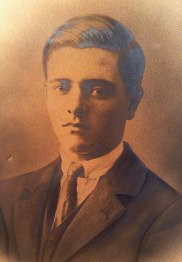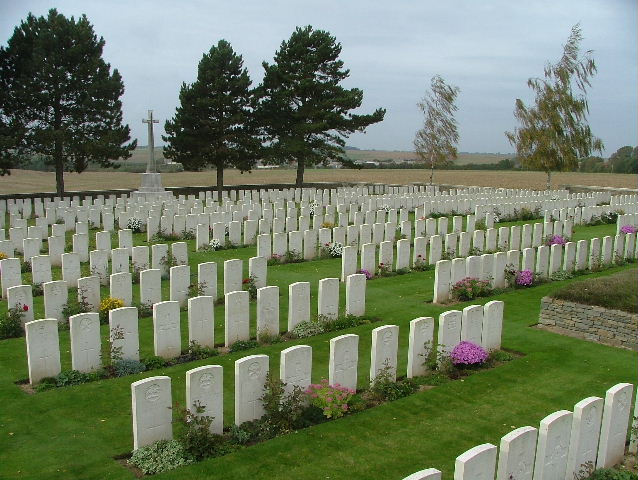Name
William Arthur Hutchin
Conflict
First World War
Date of Death / Age
19/10/1918
Rank, Service Number & Service Details
Private
97488
Machine Gun Corps (Infantry)
15th Bn.
Awards: Service Medals/Honour Awards
Not Yet Researched
Cemetery/Memorial: Name/Reference/Country
HIGHLAND CEMETERY, LE CATEAU
VIII. C. 9.
France
Headstone Inscription
Not Researched
UK & Other Memorials
Standon War Memorial,
St Mary’s Church Memorial, Standon,
Puckeridge Memorial Plaque, Standon Village Hall, Standon,
We are not aware of any memorial in Layston
Biography
William Arthur Hutchin was a Private, No. 97488, in the Machine Gun Corps, 15th Bn. and previously in the Cambridgeshire Regiment, as No. 330911.
He was killed in action 19th October 1918, aged 19 years, and is buried at Highland Cemetery, Le Cateau, France - Grave Ref: Vlll. C. 9.
William was born in Layston (Buntingford) 7th January 1899, to Rosa/Rose Mary Kimpton, and an unnamed father. Rose set up home with Louis/Lewis Hutchin as man and wife, although in fact they did not marry until 1946. Presumably William was still legally a Kimpton, and may not have known it.
We find Rose Kimpton and Louis Hutchin in the same household for the first time on the 1901 census, living with Rose’s parents who ran the Windmill pub in Buntingford. William (Willie), however, was not living with them at that point, but with the Dellar family in Ashwell, who were related through William’s maternal grandmother, yet he is described as a ‘boarder’ at just over two years old!
Later in 1901 a brother (or stepbrother?) was born, followed at intervals between 1903 and 1910 by three daughters and another son. During that time they lived at Powell’s Green, Braughing , then at Hoppit in Puckeridge, and later still at Eleanor Cottage, Standon, which was the address William gave on enlistment at Hertford. It is interesting to note that William gave Louis Hutchin as his next of kin, which may indicate that he certainly considered Louis as his father.
By May 1921, when Rose completed some Army enquiry forms requesting details of surviving siblings, another six children had been born, making Rose a mother of 12 children up to that point. She went on to have another baby who sadly died at six months old in March 1918, so she was to lose her eldest son and youngest daughter that year, then in 1922 she lost her last child at the age of 16 months. Louis supported his large family by working as a carman or carter, which would have involved horse drawn transport of hay or other goods.
The Army awarded Rose a ‘separation’ allowance of 4/- per week until 12th May 1919 following her son’s death.
William’s service record has survived so we know quite a lot about his movements:
- William, then a farm labourer, attested/enlisted and placed in Army Reserve 20.5.1916. He was mobilised 17.1.1917 and Posted 18.1.1917
- Transferred to Machine Gun Corps followed by basic training 3.4.1917 until 16.6.1917
- Posted to British Expeditionary Force, France 19.6.1917 until 5.11.1917 when he was sent home as a casualty until 21.9.1918. This action was likely to have been part of the 2nd Battle of Passchendaele. He had been subjected to a mustard gas shell attack which led to 75 days in hospital and further convalescence, during which time he was granted at least one furlough at home in Standon from 8.2.18 – 18.2.18.
- Sent back to France 22.9.1918 this time to the 15th Battalion, he was killed on 19.10.1918 during action which may have been part of the British and American advance between the Oise river and Le Cateau.
The following report appeared in the Hertfordshire Mercury dated 9th November 1918:
"DRIVER WILLIAM HUTCHIN KILLED
The news was received on the 31st ult by Mr and Mrs L Hutchin of Stortford Road, Standon, that their eldest son, Driver W Hutchin in the transport section of the MGC, was killed by shell fire on October 19th. He joined the army in January 1917 and went to the front line after six months’ training. In October of the same year he was badly gassed and wounded in the right arm. He was in England nearly a year and had only returned to France after convalescence about six weeks when his death occurred. He was 19 years of age and had proved himself a good soldier. His last letter home was written the Monday before he died. His company officer wrote a letter of sympathy to his parents. It is a tragic coincidence that his death should be similar to that of his uncle, Gunner A Avery, RFA, of Albury, who was killed by shell fire at the age of 32 on October 24 1917. "
Acknowledgments
Di Vanderson, Jonty Wild



